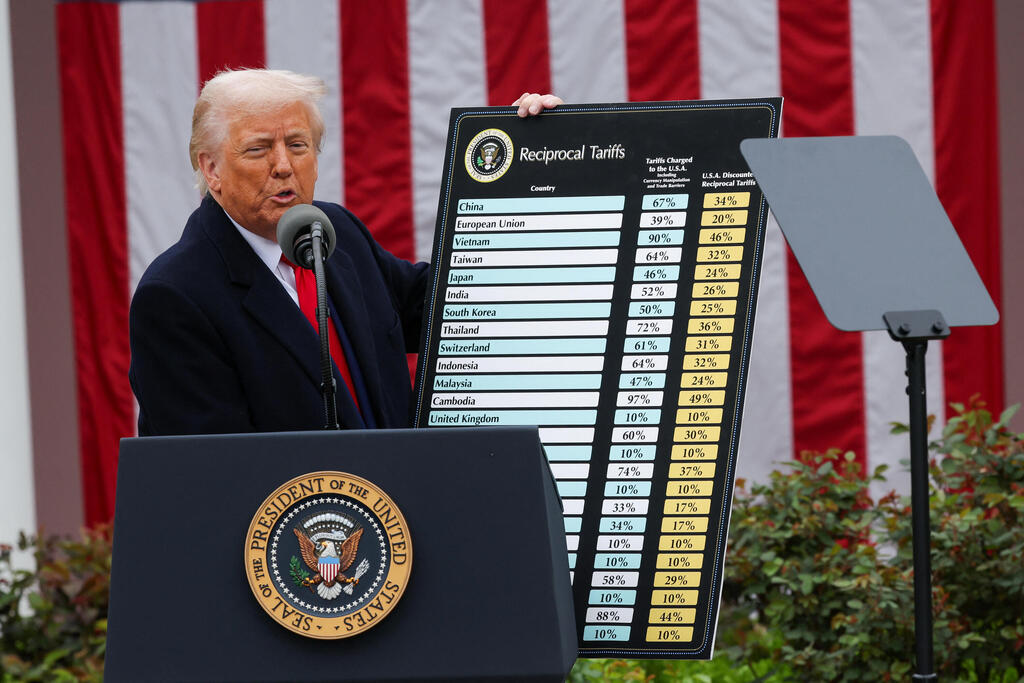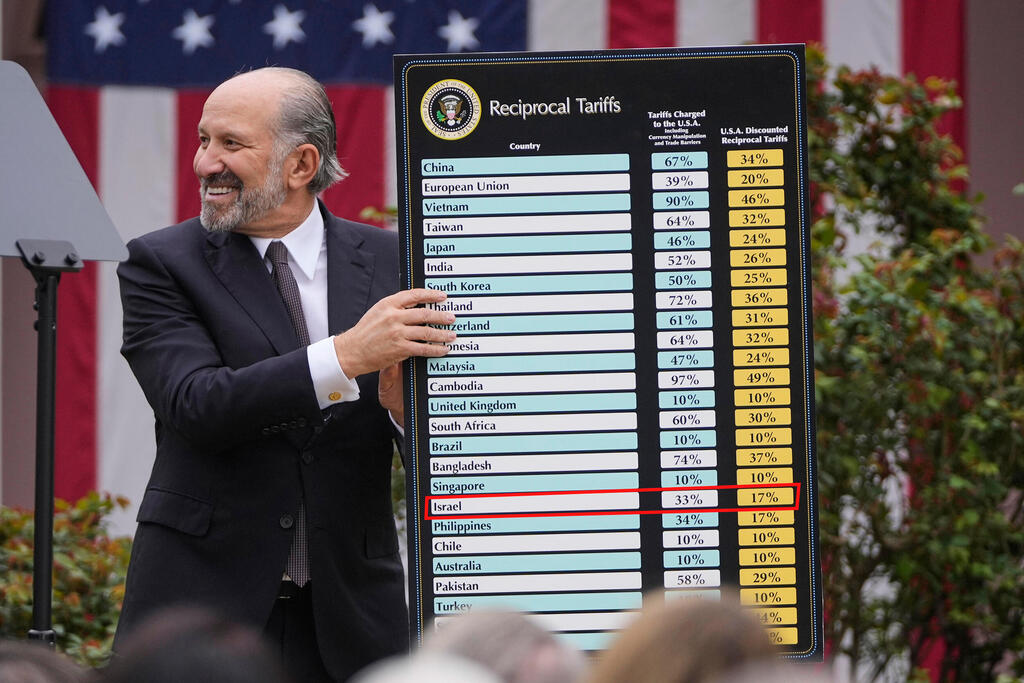Getting your Trinity Audio player ready...
U.S. President Donald Trump on Wednesday announced a sweeping new tariff policy, imposing a baseline duty of at least 10% on nearly all imported goods and significantly higher reciprocal tariffs on countries with large trade deficits with the United States—including Israel.
Under the plan, Israeli exports will face a 17% tariff, raising concerns about the potential impact on Israel’s economy and trade relations with its largest single-country export market.
In 2024, Israeli exports to the U.S. totaled approximately $34 billion in goods and services. The decision marks a sharp shift in American trade policy, aimed at restoring domestic manufacturing strength and addressing global trade imbalances. However, it also threatens to escalate a growing global trade war and drive up consumer prices in the U.S.
As part of the new policy, a flat 10% tariff will apply to most goods from all countries, except those fully compliant with the USMCA agreement—Mexico, Canada and the United States. Goods not meeting USMCA requirements will remain subject to a 25% tariff. The 10% baseline duty is set to take effect this Saturday at midnight U.S. time.
In addition, 60 countries identified by the Trump administration as the "most serious violators" will face reciprocal tariffs amounting to half of the rates they impose on American goods. These enhanced tariffs, including the 17% duty on Israel, will take effect on April 9 at midnight U.S. time.
Among the steepest tariffs: imports from China will be taxed at 34%, India at 26%, the European Union at 20%, South Korea at 25%, Japan at 24% and the United Kingdom at 10%. Jordan will face a 20% duty, while Qatar, Egypt, Saudi Arabia and Lebanon will each be hit with 10%. The highest rates—50%—were assigned to Lesotho and the French overseas territory of Saint Pierre and Miquelon.
Dr. Ron Tomer, president of the Manufacturers Association of Israel, expressed serious concern over the decision. “The Israeli industry is deeply worried by President Trump’s decision to impose new tariffs on Israel,” Tomer said. “We’re trying to understand the rationale behind this move. The claim that Israel imposes 33% tariffs on American goods is unclear, and the 17% response seems unjustified.”
Tomer warned the tariffs could harm Israeli exporters, cost jobs and reduce business activity in the American market. “This decision threatens Israel’s economic stability, could deter foreign investment and weaken the competitiveness of Israeli firms in the U.S.,” he said.
Get the Ynetnews app on your smartphone: Google Play: https://bit.ly/4eJ37pE | Apple App Store: https://bit.ly/3ZL7iNv
Trump framed the move as a declaration of “economic independence,” promising it would reduce the national debt, lower taxes and strengthen domestic production. He criticized past U.S. leaders for allowing trade imbalances to erode American prosperity and vowed that the new policy would mark the beginning of a major industrial resurgence.
The president also claimed tariff revenues could fund an extension of tax cuts. White House officials estimated the tariffs could generate roughly $600 billion annually, though economists questioned the figure and warned of inflationary consequences.
While tariffs are levied on importers, the cost is often passed on to consumers. Major retailers such as Walmart and Target may raise prices to maintain profit margins, especially if foreign suppliers choose not to absorb the extra costs. A Yale University study estimated that sweeping tariffs on imports from China, Canada and Mexico could increase annual household expenses in the U.S. by approximately $2,000.
The announcement was originally scheduled for Tuesday but was delayed by a day to avoid coinciding with April 1—April Fools’ Day.
In anticipation of the move, Israel sought to exempt itself from the new tariffs. Finance Minister Bezalel Smotrich signed an order on Tuesday eliminating all tariffs on agricultural imports from the United States, in coordination with Prime Minister Benjamin Netanyahu. The goal was to signal Israel’s status as a preferred economic partner and preempt the new U.S. measures.
Despite pushback from Israeli farmers, the Finance Ministry said the budgetary impact would be minimal, as only about 42 million shekels ($11 million) are currently collected from tariffs on U.S. agricultural imports. Most U.S. goods entering Israel are already tariff-free. Still, the full repeal of agricultural tariffs will require Knesset approval, and parliament is currently in recess.
U.S. economic officials emphasized that the tariff policy applies uniformly to all U.S. trade partners, and selective exemptions could trigger criticism or retaliatory demands from other countries.




